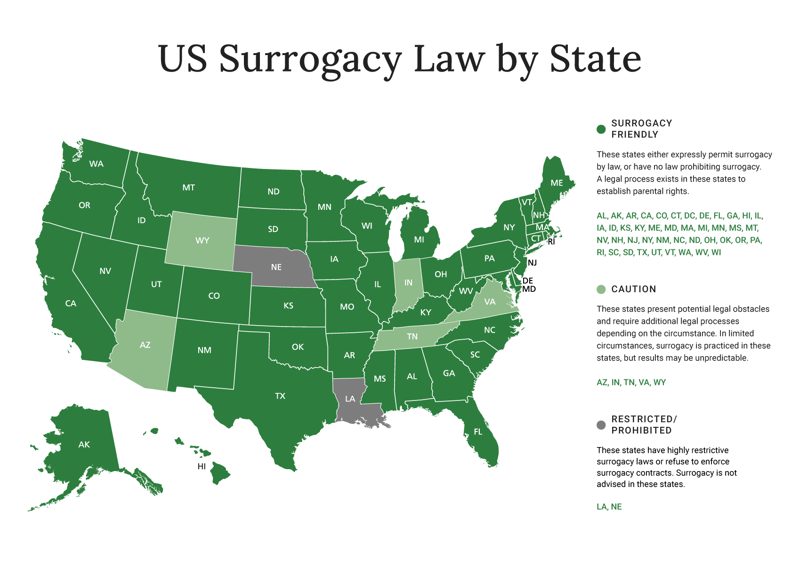Gestational surrogacy is an exciting and highly successful way to build your family. Unfortunately, surrogacy laws can vary from state to state, meaning surrogates and intended parents in certain U.S. states experience complexities and challenges posed by legal, medical, and logistical barriers.
There are no federal regulations on surrogacy, and state laws on surrogacy differ between states. Some states are more surrogacy-friendly (such as California), and others are less accommodating (like Arizona).
State surrogacy laws contribute to the modeling of the legal surrogacy process. Because of this, both surrogates and intended parents should look for surrogacy-friendly states with a supportive legal framework.
Let’s cover the best states for surrogacy in 2025, for both gestational carriers and intended parents.
Surrogacy-Friendly States in 2025
In the most surrogacy-friendly states, intended parents can receive the pre-birth orders regardless of their sexual orientation, marital status, and sometimes the genetic linkage to the baby. These surrogacy-friendly states also permit the birth certificate to feature both parents' names and allow both uncompensated and compensated surrogacy agreements.

Surrogacy in California
California is considered a very surrogacy-friendly state for both intended parents and surrogates. Whether you live in a large city such as San Francisco, San Diego, Sacramento, Los Angeles, or the less inhabited regions of California, it's arguably the best state for surrogacy in the country. It's even home to the best IVF clinics in the world.
The different types of intended parents who can opt for surrogacy to build their families in California include:
- Heterosexual couples that have struggled with infertility
- Intended parents with a genetic disorder or health problem that they don't want to pass on to their baby
- Intended mothers who cannot carry a baby
- Intended parents of the same sex who wish to have a genetic relationship with their child
Surrogacy-Accommodating U.S. States
In some states, there are no legislations outlawing surrogacy, and gestational surrogacy is typically allowed by statute. They include:
- Alabama
- Alaska
- Arkansas
- Colorado
- Florida
- Georgia
- Hawaii
- Illinois
- Iowa
- Kansas
- Kentucky
- Maryland
- Minnesota
- Missouri
- Mississippi
- Montana
- North Carolina
- North Dakota
- New Mexico
- Ohio
- Oklahoma
- Oregon
- Pennsylvania
- South Carolina
- South Dakota
- Texas
- Utah
- Wisconsin
- West Virginia
Less Friendly States for Gestational Surrogacy
You may practice surrogacy in these states, but you might encounter legal obstacles to completing the surrogacy process.
These states include:
In states where surrogacy law is unclear, there may be significant variations in the outcomes of surrogacy contracts. Instead, court rulings on previous surrogacy cases determine most state-by-state surrogacy policies and regulations.
Therefore, the outcomes of surrogacy cases in some states may differ from judge to judge or from one county to another. Unique personal circumstances can also influence the legal surrogacy process.
U.S. States Where Surrogacy Contracts are Prohibited
There are only a few states that explicitly prohibit surrogacy contracts or are highly restrictive to certain circumstances. These red-light states include:
Recent Legislative Changes That Impact Surrogacy in the U.S.
The U.S. surrogacy laws continue to evolve, and recent legislative changes in 2024 and 2025 are reshaping options for intended parents and surrogates.
Here are some of the most significant updates that could influence your surrogacy journey:
- Michigan: As of April 1, 2025, Michigan has officially legalized compensated surrogacy agreements for the first time in decades. Under the new Assisted Reproduction and Surrogacy Parentage Act, both traditional and gestational surrogacy contracts are now legally enforceable. The law also simplifies parentage by allowing intended parents to be listed on the child’s birth certificate without the need for post-birth adoption. These changes make Michigan a newly surrogacy-friendly state to consider.
- Massachusetts: The Massachusetts Parentage Act, effective January 1, 2025, provides clear legal protections for everyone involved in surrogacy. It includes enforceable contracts, recognition of parentage regardless of marital status or genetic connection, and formalizes the state’s stance as a supportive environment for surrogacy.
- New York: While New York legalized compensated gestational surrogacy in 2021, additional 2025 amendments have strengthened the regulatory framework. Agencies must now monitor adherence to informed consent and eligibility standards. The law also expands access for intended parents from outside New York and enforces a Surrogates’ Bill of Rights.
A growing number of states have also introduced or passed "personhood" legislation, which grants legal rights to embryos and fetuses.
These laws can complicate IVF and surrogacy procedures, and their interpretation often depends on state politics or individual judges.
For many intended parents, these developments add legal uncertainty and influence decisions to pursue surrogacy in more surrogacy-friendly states.
Because of this patchwork of laws, more intended parents are engaging in cross-state surrogacy arrangements—living in one state while working with surrogates or clinics in another.
While this is increasingly common, it adds complexity and requires you to work with experienced legal and medical professionals.
Learn More About Surrogacy Laws
The surrogacy process does not have to be stressful. At Hatch, we hold your hand throughout this journey and help you have a smooth surrogacy experience. Reach out to our team today to learn more. We're happy to help.
You May Also Like
These Stories on Egg Donation - For Donors

